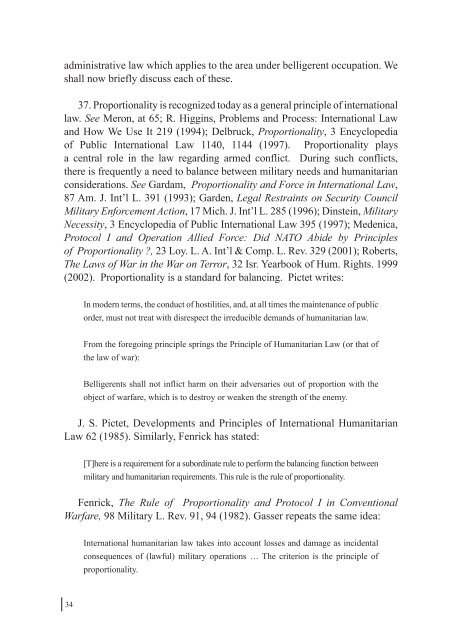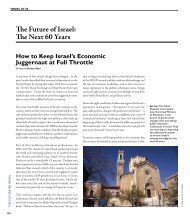Judgments of the Israel Supreme Court: Fighting Terrorism within ...
Judgments of the Israel Supreme Court: Fighting Terrorism within ...
Judgments of the Israel Supreme Court: Fighting Terrorism within ...
You also want an ePaper? Increase the reach of your titles
YUMPU automatically turns print PDFs into web optimized ePapers that Google loves.
administrative law which applies to <strong>the</strong> area under belligerent occupation. We<br />
shall now briefly discuss each <strong>of</strong> <strong>the</strong>se.<br />
37. Proportionality is recognized today as a general principle <strong>of</strong> international<br />
law. See Meron, at 65; R. Higgins, Problems and Process: International Law<br />
and How We Use It 219 (1994); Delbruck, Proportionality, 3 Encyclopedia<br />
<strong>of</strong> Public International Law 1140, 1144 (1997). Proportionality plays<br />
a central role in <strong>the</strong> law regarding armed conflict. During such conflicts,<br />
<strong>the</strong>re is frequently a need to balance between military needs and humanitarian<br />
considerations. See Gardam, Proportionality and Force in International Law,<br />
87 Am. J. Int’l L. 391 (1993); Garden, Legal Restraints on Security Council<br />
Military Enforcement Action, 17 Mich. J. Int’l L. 285 (1996); Dinstein, Military<br />
Necessity, 3 Encyclopedia <strong>of</strong> Public International Law 395 (1997); Medenica,<br />
Protocol I and Operation Allied Force: Did NATO Abide by Principles<br />
<strong>of</strong> Proportionality ?, 23 Loy. L. A. Int’l & Comp. L. Rev. 329 (2001); Roberts,<br />
The Laws <strong>of</strong> War in <strong>the</strong> War on Terror, 32 Isr. Yearbook <strong>of</strong> Hum. Rights. 1999<br />
(2002). Proportionality is a standard for balancing. Pictet writes:<br />
In modern terms, <strong>the</strong> conduct <strong>of</strong> hostilities, and, at all times <strong>the</strong> maintenance <strong>of</strong> public<br />
order, must not treat with disrespect <strong>the</strong> irreducible demands <strong>of</strong> humanitarian law.<br />
From <strong>the</strong> foregoing principle springs <strong>the</strong> Principle <strong>of</strong> Humanitarian Law (or that <strong>of</strong><br />
<strong>the</strong> law <strong>of</strong> war):<br />
Belligerents shall not inflict harm on <strong>the</strong>ir adversaries out <strong>of</strong> proportion with <strong>the</strong><br />
object <strong>of</strong> warfare, which is to destroy or weaken <strong>the</strong> strength <strong>of</strong> <strong>the</strong> enemy.<br />
J. S. Pictet, Developments and Principles <strong>of</strong> International Humanitarian<br />
Law 62 (1985). Similarly, Fenrick has stated:<br />
[T]here is a requirement for a subordinate rule to perform <strong>the</strong> balancing function between<br />
military and humanitarian requirements. This rule is <strong>the</strong> rule <strong>of</strong> proportionality.<br />
Fenrick, The Rule <strong>of</strong> Proportionality and Protocol I in Conventional<br />
Warfare, 98 Military L. Rev. 91, 94 (1982). Gasser repeats <strong>the</strong> same idea:<br />
International humanitarian law takes into account losses and damage as incidental<br />
consequences <strong>of</strong> (lawful) military operations … The criterion is <strong>the</strong> principle <strong>of</strong><br />
proportionality.<br />
34

















